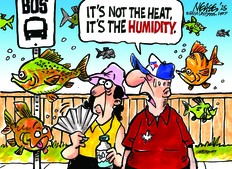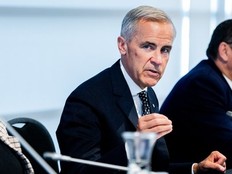OPINION: Canadians win when politicians compete on tax cuts

Article content
The best way the government can make life more affordable is to let people keep more of their own money and tax cuts will do just that.
Advertisement 2
Story continues below
Article content
Article content
Article content
After years of higher taxes, this election is turning into a tax-cutting campaign.
Liberal Leader Mark Carney announced he would cut the lowest income tax bracket by one percentage point. Carney estimates that would save a two-income family up to $825 a year.
Conservative Leader Pierre Poilievre announced he would more than double Carney’s promised income tax cut.
Poilievre would cut the lowest income tax bracket from 15% to 12.75%. That would save a two-income family up to $1,800.
Both major parties are duelling over who can cut taxes the most. So far, Poilievre is offering twice as much income tax relief as Carney.
Poilievre’s tax cut would cover the cost of groceries for a family of four for more than a month. Those savings could buy new bicycles for a dozen kids or cover six months of swimming lessons for five children.
Article content
Advertisement 3
Story continues below
Article content
Tax cuts matter because the amount of money governments take from Canadians is obscene.
The average Canadian family pays about 43% of their income in taxes.
Canadians are forced to pay more in taxes than they spend on food, housing and clothing combined.
The government taxes Canadians way too much and it needs to stop because half the population is broke. About 50% of Canadians report they are within $200 of not being able to make the minimum payments on their bills each month.
Politicians are also promising to cut carbon taxes.
Carney is cutting the consumer carbon tax to zero on April 1.
Advertisement 4
Story continues below
Article content
But the devil is always in the details.
Carney isn’t scrapping the carbon tax. He plans to “change” it.
Carney plans to hit businesses with hidden carbon taxes and hopes Canadians won’t notice when businesses have to pass on those costs through higher prices and fewer jobs.
What Carney won’t admit is that a fuel refinery can’t just eat the cost of his hidden industrial carbon tax. It has to add it to the price of the gasoline and diesel it’s producing for gas stations to sell.
The same goes for a fertilizer plant that has to pass on carbon tax costs to farmers, which will make food cost more at the grocery store.
Steel and aluminum companies will have a crucial choice to make: Will these businesses stick around in Canada, getting hammered by hidden industrial carbon taxes, or will they shift production to the United States, where they won’t be punished with carbon taxes?
Advertisement 5
Story continues below
Article content
This is why Poilievre’s promise on carbon taxes is a game-changer.
Poilievre is the first major political leader in Canada to promise to scrap all carbon taxes.
By getting rid of the consumer carbon tax and hidden carbon taxes on business, Poilievre would save Canadians serious money.
Obliterating the hidden industrial carbon tax also reduces the risk of industries fleeing to the U.S. and taking jobs with them.
After years of higher taxes, this election is off to a good start for taxpayers.
Now, all party leaders should commit to big tax cuts for Canadian businesses to make them more competitive in the wake of American tariffs
Franco Terrazzano is the federal director and Kris Sims the Alberta director of the Canadian Taxpayers Federation
Article content











Postmedia is committed to maintaining a lively but civil forum for discussion. Please keep comments relevant and respectful. Comments may take up to an hour to appear on the site. You will receive an email if there is a reply to your comment, an update to a thread you follow or if a user you follow comments. Visit our Community Guidelines for more information.